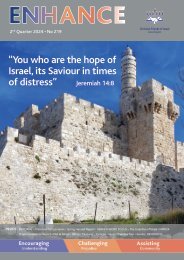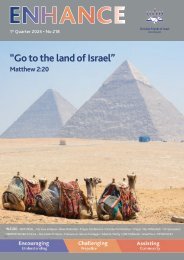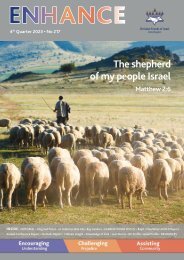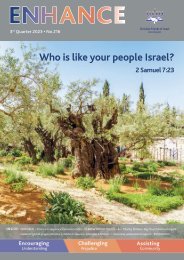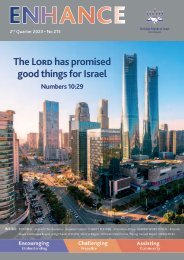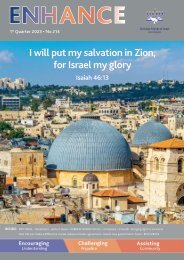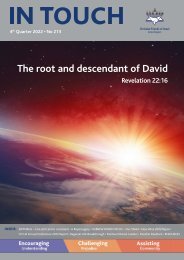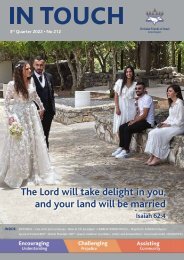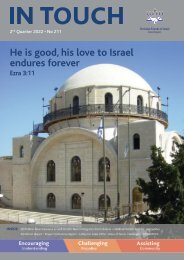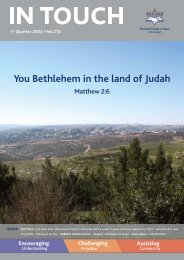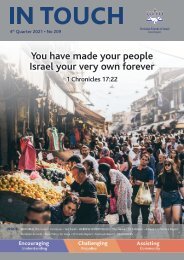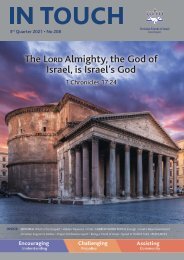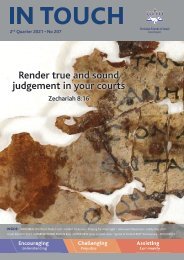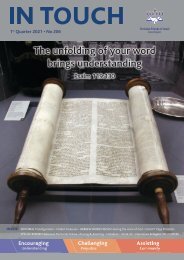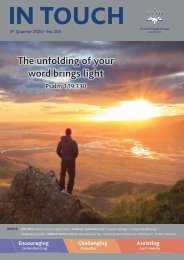In Touch - 3rd Quarter 2020
News on CFI during lockdown, an important study on the Hebrew word for 'jealousy', an article describing a Bible translation controversy, a summarised letter about sovereignty over the West Bank and some memories of David Pawson - Friend of Israel.
News on CFI during lockdown, an important study on the Hebrew word for 'jealousy', an article describing a Bible translation controversy, a summarised letter about sovereignty over the West Bank and some memories of David Pawson - Friend of Israel.
Create successful ePaper yourself
Turn your PDF publications into a flip-book with our unique Google optimized e-Paper software.
Feature<br />
Do your best<br />
Jacob Vince<br />
<strong>In</strong> his second personal letter, Paul instructs<br />
Timothy to, ‘Do your best to present yourself to<br />
God as one approved, a worker who does not need to<br />
be ashamed and who correctly handles the word of truth’<br />
(2 Timothy 2:15).<br />
Another word for correctly is accurately.<br />
If we take the example of numbers, just think what<br />
would happen if we did not use them accurately.<br />
Well, the Bible is far more important than numbers, so<br />
we need to make sure we handle it accurately.<br />
Neither is Paul asking Timothy something<br />
unreasonable. He simply asks him to do his best.<br />
Recently we remembered 75 years since the end of<br />
the Second World War. <strong>In</strong> his speech describing what<br />
he called Britain’s greatest day, the country’s leader<br />
Churchill said,<br />
“<strong>In</strong> all our long history we have never<br />
seen a greater day than this. Everyone<br />
man or woman has done their best”<br />
(Winston Churchill, 8 May 1945).<br />
It is within the grasp of everyone to<br />
do their best. To end the war, it was<br />
a combined effort toward victory.<br />
<strong>In</strong> the context of the Bible, we are<br />
asked to ‘do our best’ to handle it<br />
accurately.<br />
If we are encouraged to handle the<br />
Bible accurately, this must mean there<br />
is a temptation to handle it incorrectly or<br />
inaccurately.<br />
This is exactly what happens at the beginning of<br />
the Bible. God gives very clear instruction to Adam<br />
and Eve. They are granted the opportunity to eat<br />
of every tree in the garden apart from one, the tree<br />
of the knowledge of good and evil. God’s enemy<br />
immediately questions what God has said.<br />
“Did God really say?” (Genesis 3:1)<br />
Next, Eve repeats what God said but adds to it. She<br />
says God said that they were not able to eat of this one<br />
tree nor touch it. There is no record of God saying<br />
they should not touch it. The result is that Eve is<br />
deceived, ate of the fruit and gave some to Adam who<br />
also ate of it.<br />
<strong>In</strong> case we think Eve is responsible, Adam was there<br />
all along and didn’t intervene or take responsibility<br />
himself. Not only that, but he sought to place the<br />
blame on Eve, who in turn placed it on God’s enemy.<br />
<strong>In</strong> the event, both were held responsible and suffered<br />
the consequences firstly of doubting God’s word and<br />
then acting against it. This illustrates well for us and<br />
all humankind the importance of accurately handling<br />
the word of God. The rest, as they say, is history –<br />
literally!<br />
We all know the term manuscript for music, or script<br />
for a drama. <strong>In</strong> both instances musicians and actors<br />
need to handle it accurately to perform it properly.<br />
Paul describes the word of truth as Script-ure. Like a<br />
script in drama and a music manu-script, we need to<br />
get to know it, practice it and use it properly.<br />
Look at the status Paul gives the Bible-script or<br />
scripture. Paul writes,<br />
“All scripture is God-breathed and is useful for<br />
teaching, rebuking, correcting and training in<br />
righteousness, so the man of God may be<br />
thoroughly equipped for every good work”<br />
(2 Timothy 3:16-17)<br />
First scripture is introduced as<br />
God-breathed or in another word<br />
‘inspired’.<br />
Some people struggle to see God as<br />
three persons and at-one, but from<br />
the very start of the Bible, all three<br />
are there, at-one with themselves.<br />
There is God who speaks his word,<br />
Jesus who is God’s eternal word, and<br />
the Holy Spirit – the breath of God – all<br />
in perfect relationship.<br />
Having described scripture, the Bible, as ‘Godbreathed’,<br />
Paul writes that it is useful for four things,<br />
‘teaching, rebuking, correcting and training’, which seem<br />
to work well in that order.<br />
It first needs to be accurately taught, this in turn<br />
shows up faults which need recognising, then<br />
rebuked, next these faults need correcting. Finally,<br />
the corrections need to be trained into us.<br />
For over 2,000 years we have had the completed Bible,<br />
which is authoritative and our primary source. Over<br />
the years it has been misunderstood and mishandled.<br />
Our generation has the great privilege to do our best,<br />
in God’s strength to rectify this.<br />
We can all pray and play a part to this end, so that<br />
the message God wants to communicate to all, to and<br />
through both Israel and the Church, in word and<br />
deed, becomes a reality today.<br />
4 IN TOUCH • 3 rd <strong>Quarter</strong> <strong>2020</strong>



